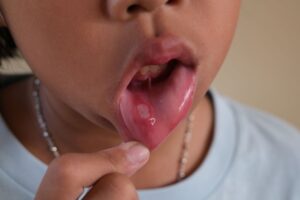Getting a canker sore is a common experience for many people. These small but painful mouth ulcers can be a nuisance, but they are not contagious and typically heal on their own. This guide will help you confidently identify a canker sore, understand potential causes, learn about treatment options, and know when it’s time to see a doctor.


Podcast:
Learn More About Aphthous Ulcers
1.What is a Canker Sore?
A canker sore, known medically as an aphthous ulcer, is a small lesion that forms inside your mouth. This section will help you confidently identify a canker sore by its distinct appearance and common locations.
What Do They Look and Feel Like?
Canker sores are typically painful, shallow ulcers that are round or oval in shape. They can be recognized by a distinct, inflamed reddish edge or halo that surrounds a central area. This central part is usually covered by a thin layer (called a pseudomembrane) that may appear yellow, green, or gray.
Where Do They Usually Appear?
Canker sores form on the soft, movable tissues inside the mouth, avoiding the gums and the roof of the mouth.
Common Locations Inside the Mouth
- Inside of the lips and cheeks
- Under the tongue
- On the tongue
Now that you can identify a canker sore, let’s explore the factors that may cause them to appear.
2. Why Do I Get Canker Sores?
While the exact cause of canker sores is not definitively known, experts believe that a combination of a genetic predisposition and various external triggers is responsible. This section outlines the most commonly identified risk factors and potential triggers that can lead to an outbreak.
Common Risk Factors
Some people are simply more prone to developing canker sores than others. You may have a higher risk if you identify with one or more of the following factors:
- Having a family history of canker sores
- Being a woman
- Being under the age of 40
- Being a nonsmoker
Potential Triggers
For individuals who are susceptible to canker sores, certain events or conditions may trigger an outbreak. These can include:
- Minor injury or trauma to the inside of the mouth (e.g., from dental work, an accidental cheek bite)
- Emotional stress
- Sensitivities to certain foods
- Hormonal changes
- Vitamin deficiencies
It is important to note that the evidence for these specific triggers is often conflicting, and they may not apply to everyone.
While you may not be able to change your risk factors, understanding your triggers can help you manage your canker sores, which we’ll discuss next.
3. How to Manage Canker Sores
Treatment for canker sores is focused on two primary goals: relieving pain and promoting faster healing. Most sores will heal on their own, but various strategies can make the process more comfortable. This section covers both at-home care and medical treatments.
3.1. At-Home and Over-the-Counter (OTC) Care
Self-Care Strategies
- Avoid Irritation: Gently brush your teeth and be careful to avoid injuring the sore with your toothbrush.
- Modify Your Diet: Temporarily avoid foods that might be triggers or could irritate the sore further, such as spicy, acidic, or rough-textured foods (like hard crackers or chips).
Over-the-Counter Relief Several over-the-counter products are available for symptomatic relief. One option is 10% carbamide peroxide, a cleansing agent that can be applied to the sore up to four times a day to help clean the area and relieve discomfort. Be sure to spit out any excess after applying.
4. When to See a Doctor
While most canker sores are harmless and resolve on their own, persistent or severe ulcers require a professional evaluation to rule out other conditions and ensure you receive the proper treatment.
Seek Medical Advice If Your Canker Sores Are:
- Unusually large or spreading.
- Lasting for more than two weeks without healing.
- Extremely painful, preventing you from eating or drinking.
- Recurring very frequently, with new sores appearing as old ones heal.
